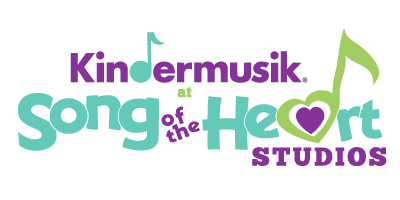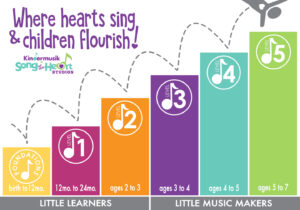 We are the place where hearts sing and children flourish. This is exhibited in our approach to and philosophy of learning. One of the many strengths of the Kindermusik philosophy is its focus on the different developmental needs of each stage of childhood. Each class level is designed to give your child the most developmentally appropriate, stimulating musical activities to nurture their development right where they are. We celebrate and explore each age – rather than rush forward. Coaxing forth the joy and creativity in each individual child and respecting their unique pattern and pace in growing up. At Kindermusik, we grow WITH your child for 7 beautiful years.
We are the place where hearts sing and children flourish. This is exhibited in our approach to and philosophy of learning. One of the many strengths of the Kindermusik philosophy is its focus on the different developmental needs of each stage of childhood. Each class level is designed to give your child the most developmentally appropriate, stimulating musical activities to nurture their development right where they are. We celebrate and explore each age – rather than rush forward. Coaxing forth the joy and creativity in each individual child and respecting their unique pattern and pace in growing up. At Kindermusik, we grow WITH your child for 7 beautiful years.
Since Kindermusik nourishes the development of the whole child, you will see an overlap in ages between the various classes. Our levels and ages are there to guide you, but there is flexibility in certain age spans which overlap certain levels. Our Foundation Level and Level 1 are self explanatory, as is level 4. The “transitional stages”, 18-20 months, 3 to 3 ½, and 5, are points at which we can give you guidance about which level might be most beneficial and appropriate. Below are some characteristics which indicate that your child will obtain the maximum developmental benefits and joy from a particular class level. They are there to assist you in making this important decision. While no two children develop in the exact same way, a child who is ready for a certain curriculum will display many of the characteristics of that level. We are always happy to discuss individual questions or concerns and talk you through what might be best for your child. Contact us at info@songheart.com or at 801-953-0416.
To Begin - Ask yourself some important questions about these transitional stages
- Which of these levels will my child thrive in, rather than just being able to get along in?
- Am I considering my child’s joy and emotional development as much as their cognitive development?
- Is my child eager for added independence and challenges, or are they most delighted by sharing special time with me to help guide and support them?
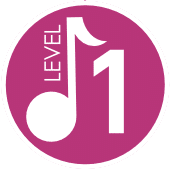
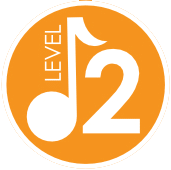
Moving from Level 1 to Level 2
- Between 20 months and 2 years
- Uses gestures and language to indicate needs
- Sustains interest in an activity for several minutes
- Shows cooperative/interactive learning: is interested in what others are doing and in sharing that activity (whether by observing, parallel exploration, or imitation)
- Can understand and follow verbal directions of two steps; will generally cooperate with a request
- Is learning to explore objects in purposeful, symbolic ways, rather than mouthing, dumping, etc.
- Shows interest in concept pairs – high/low, fast/slow, loud/quiet, stop/start
- Responds to song and rhyme; may join familiar ones, and enjoys word and language play
- Can reliably point to named body parts, is beginning to understand number and color concepts
- Group interaction and connection with an activity is becoming more appealing than individual exploration of the environment
- Physically, walks confidently, explores other types of movement (run, tiptoe, jump, turn) – enjoys own mobility and will try new movements s/he sees others doing
- Beginning to understand and participate in “sitting” activities: finger plays, lap bounces, singing

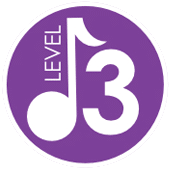
Moving from Level 2 to Level 3
- 3 to 3.5 years of age
- Separates from adult without crying; enjoys interacting as part of a peer group
- Thinks creatively – has moved from “What animals do you know?” to “What might we see in our pretend tree?”
- Recognizes the needs of others; can be empathetic, take turns (usually!), understands classroom rules and why they are important
- Developing abstract language and thought – can sustain pretend play and enjoy developing an idea for up to 5 minutes or more
- Can tell stories, relate a series of ideas, connect own experiences to those of others
- Is developing patience – can accept “she is playing the drum and you have the tambourine today”
- Has a broad movement vocabulary, and can explore the same movement in diverse ways – “What other parts of your body can twirl?”
- Can sit and listen to a story or musical selection for several minutes, and comment on what they have heard
- Beginning to recognize shapes, colors, weather, seasons, counting
- Participates in singing, reciting rhymes; follows a model for movement or instrumental play

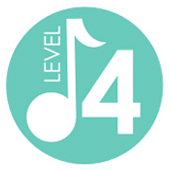
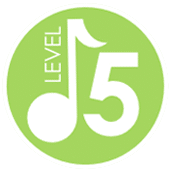
Moving from Level 3 or 4 to Level 5
Level 5 realizes the developmental leap to school-age child. Musically, it is the culmination of all that has come before. In addition to movement, instrumental play, singing, and creating, Level 5 students begin to learn musical notation (note and rhythmic), begin to explore playing in an ensemble and learn to play a melody instrument, the glockenspiel. We strongly recommend that the step to Kindermusik Musicians be made by children who are entering Kindergarten, rather than those who are still in preschool. If your child has a fall or early winter birthday, and either falls just after the school cutoff or you have chosen to wait for the following year to begin school, consider the guideposts below when choosing to begin Level 5. This class is a sequential, two year curriculum – new students may join as class space allows, with the understanding that the family and child will work with the teacher to catch up on concepts and learning already covered. The child ready for Level 5
- School age – in or near Kindergarten
- Exhibits self confidence and reliability in a classroom or group situation
- Has basic pre-reading skills; understands that writing moves from left to right, and from the top of the page down
- Has good fine motor control – reproduces shapes and letters, enjoys puzzles, games, drawing
- Follows directions reliably, can participate in an activity with groups doing different things -simultaneously
- Has good abstract thinking skills – can answer questions such as “How do you think a composer can make music sound like birds?”
- Can sing whole songs, and is developing a good sense of pitch
- Is eager to learn, and is developing self-motivation – can work independently for short periods toward a set goal
When Should My Child Begin Private Instrumental Instruction?
As a general rule, most children are not ready to begin formal instrumental training before the age of 6 or 7 for piano or string instruments, and most instructors will not accept students younger than 8 or 9 for other orchestral or band instruments. Before that, they tend to lack the size, stamina, and outcome-oriented commitment to make lessons a joyful and successful experience. Children are individuals, with a wide range of aptitude, but all children possess the ability to enjoy lifelong music making, and this ability can be greatly influenced by how we choose to approach their earliest experiences.
Kindermusik contains all of the needed elements to develop a child who is musically aware and who has the solid foundation to make lessons a natural and joyous next step. Children who grow up in Kindermusik have had chances to succeed, be nurtured and encouraged in their early creative explorations, and develop a core of music theory instilled through voice, body, and mind. Music for them is a natural part of their environment, and they have gained the language of note, rhythm, and expression to help them as they select which instrument they most wish to make their own. Many experts agree that early musical enrichment lays a foundation for musicianship which may accelerate later progress on an instrument.
Children who graduate from our two-year Level 5 Kindermusik Musicians program have a strong basis in theory, musicianship, and instrumental technique. More importantly, they have been allowed to holistically develop through music, in a supportive and encouraging atmosphere, which lays the groundwork for a lifetime of positive outlook not only towards music learning, but towards learning in general. Let it begin with Kindermusik!

